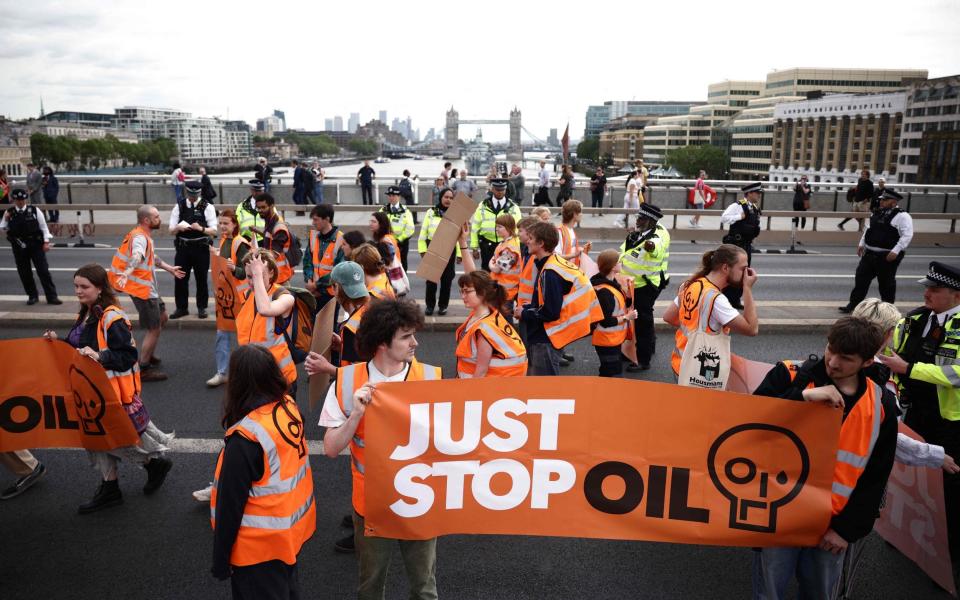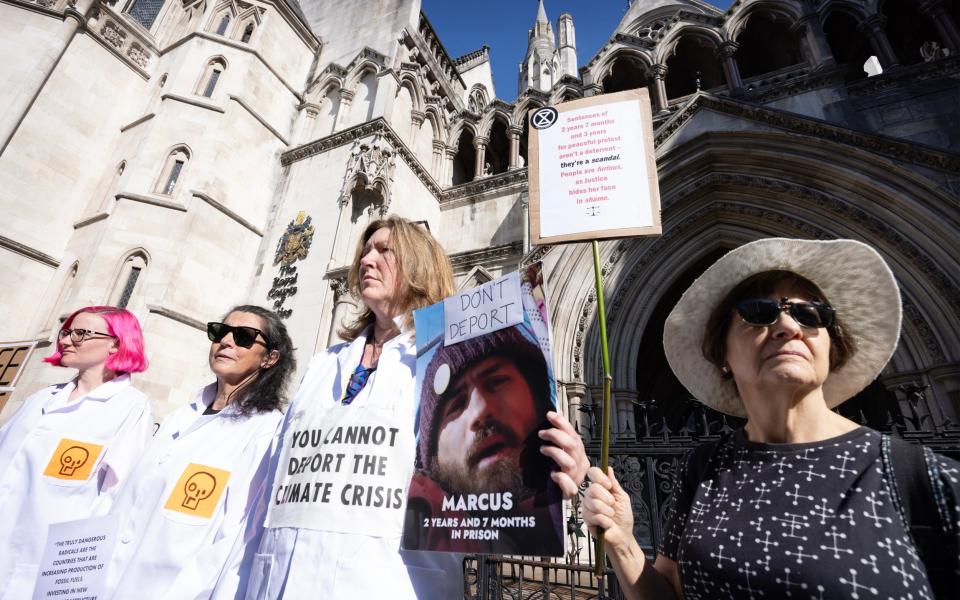The barrister taking on Just Stop Oil

Adam King is loath to make himself even more unpopular with Just Stop Oil. He is pondering whether there would be any area of the law in which he would feel uncomfortable prosecuting, any case he would feel ethically unable to defend.
He can only come up with one example. “I wouldn’t massively enjoy prosecuting someone under the hunting act,” he says. “But I’d do it.”
Lawyers are not supposed to allow their personal biases to come into their practice. In a democracy where Lucy Letby has as much right to full-throated, impartial representation as anyone else, it should really be as simple as that. Not so for the 120 lawyers who six months ago vowed they would not prosecute peaceful climate protesters or act for oil companies.
Among them were barristers (including six King’s Counsel) who defied bar rules by signing a declaration to “withhold” their services in such cases. They self-referred to the Bar Standards Board, challenging it to bring proceedings against them for breaking the “cab rank” rule which means chambers must take on the next case they are available to.
A month later, King prosecuted two Just Stop Oil (JSO) protesters who had scaled the Queen Elizabeth II bridge on the Dartford Crossing. One was sentenced to three years in prison, the other two years and seven months. After the trial, King tweeted that he was “proud to have done a bit of public service in prosecuting this trial”.
“To assert ‘conscientious objection’ in cases like this is to encourage the identification of counsel with their clients – which is obviously bad for justice generally.”
That a group of lawyers can take a stand like this (and be hailed as heroes by some for doing so) in 2023 should be cause for concern, says King, who feels his peers have been “irresponsible”.
Not only is it “extremely unusual” and “in breach of the code of conduct” if you refuse to take a case you are instructed in, but it also sets a dangerous precedent, he says. “It encourages this identification of lawyers with the causes or behaviour of the clients they represent.”

More than that, King feels it speaks to a worrying trend in the legal world. You would hope the courts might be the one place to have escaped the culture wars, that lawyers and judges would be immune to the shouting coming from either side of an increasingly wide aisle. But somewhere in the midst of it all, King says, a growing fear has crept into the law. Increasingly, solicitors and barristers don’t want to be seen to take on certain kinds of cases.
“If lawyers start getting scared to represent certain classes of client, because they’re worried about their reputation or whether the online mob will turn against them, then that class of client will find it hard to get representation,” says King.
We are speaking at his chambers, QEB Hollis Whiteman, just off Cannon Street in the City. At just 43, with a 15-month-old and another baby on the way, he might seem an unlikely candidate to prosecute a climate activism case. More so when you learn he and his wife live on a boat on a canal where there are “a few Extinction Rebellion flags” around. “I have a hippy streak so I’m not entirely out of place there but I didn’t tell many people about the JSO case,” he says with a smile.
Debates over whether climate protesters should face criminal charges are gathering pace.
This week, it was confirmed that a 68-year-old woman will be prosecuted for contempt of court after she staged a protest outside a court and tried to encourage jury members to acquit two climate change protesters. On Wednesday, Channel 4 is broadcasting a documentary presented by Chris Packham, called Is It Time To Break The Law?, in which he investigates the methods of activists including Just Stop Oil.
King says the chilling effect on the legal profession goes beyond eco-protest cases.
“Some gender critical clients – people fighting free speech type cases – have found it difficult to find solicitors. I worry that in 10 years’ time, or much sooner, a barrister could find himself at the sharp end of a really nasty mob that could have professional consequences.
“I do some free speech work – it’s something I care about and I do some of that pro bono – and as ever with free speech cases you’re talking about usually the expression of unpopular (at least in some areas) opinions.”
He says lawyers defending in sex crime cases have also received “really nasty criticism for doing absolutely nothing wrong”.
“That kind of thing worries me a lot and is of course happening more and more.”

In climate cases, barristers have found themselves facing criticism, King says, often from their own peers. “Criticism has recently been made of commercial sets of chambers and [their] members for advising oil companies. [Some of that] criticism has been made by a barrister eco protester.” Their disapproval? “The line goes: well, you’re assisting oil companies by advising them and therefore you’re complicit in the deaths of hundreds of millions of people.”
The idea that oil companies shouldn’t receive legal advice is preposterous, says King. “Consider parliament enacting laws – let’s say tightening the laws in a way that doesn’t favour oil companies, so increased regulation for [the] extraction of fossil fuels. Those regulations can be very complicated, the people who run the business are not going to be able to understand them easily, they’re going to need a lawyer to tell them what they can and can’t do.
“It’s in the public’s interest, and indeed in the interest of Just Stop Oil, that those oil companies understand those laws.
“To lean on lawyers to keep secret what an oil company’s rights and obligations are seems to me completely mad.”
One barrister has been “pestering” King “at every opportunity” to declare whether he has ever defended a climate protester, “the strong implication being that I bring my own attitudes and certain bias to proceedings by choosing to prosecute rather than defend”. And has he? “So far I’ve refused to answer, but given that you’ve asked me, the answer is that I’ve defended one protest case in the past that had nothing to do with the climate and I’ve prosecuted one, so I don’t think that’s indicative of any bias.”
Given the Government’s new roster of protest offences, it’s safe to assume cases like the one King prosecuted in April are only going to become more common. The Public Order Act 2023 made tactics favoured by activist groups like JSO (like locking yourself to buildings or obstructing transport) illegal. Even so, the sentence handed down to the pair King prosecuted seems to have surprised him.
Morgan Trowland and Marcus Decker had used ropes and climbing equipment to scale the bridge’s cables in October 2022. They hung 200ft above the road in hammocks (they’d also, naturally, unfurled a large orange banner) meaning the bridge had to be closed.
The stunt caused more than 24 hours of disruption. Essex Police said a pregnant woman who needed urgent medical help was affected. During the trial, King said the closure “caused gridlock for miles around”. “Small businesses lost, in some cases, hundreds of thousands of pounds, people missed loved ones’ funerals, children were left on the side of the road waiting for buses.”
The pair were found guilty of causing a public nuisance and sentenced to three years in prison. “The trial judge’s approach was bold relative to the types of sentence that had been given out up to that point,” says King.
While most protest cases tend to be dealt with in the magistrates’ court and will get you a conditional discharge and a £150 fine, Trowland and Decker were remanded in custody until trial and given three years. They lost an appeal to have the sentence reduced in July.

“I think it would have been impossible to expect a sentence like that,” says King. “But the judge focused on the deterrent, attached a significant weight to that deterrent, and noted correctly that these protests were escalating, the severity of them. And his approach was not criticised by the Court of Appeal. And that is quite a big shift. Because that will affect sentencing for less serious cases.”
Was the judge making an example out of them? “Yes absolutely.”
In submissions to the court, their barrister Daniel Friedman KC said the jail terms were the “longest ever handed down in a case of non-violent protest in this country in modern times”.
“The extent of the deterrent element of the offence was unduly severe, unreasonable and otherwise likely to have a ‘chilling effect’ on all protest.”
Before the appeal was dismissed, King says he couldn’t call which way the Court of Appeal might go. “I think it’s probably fair to say that the overall expectation amongst the lawyers involved in the case, including the defence, was that the sentence might go down a bit.”
He is far from jubilant at the thought these men – whom he describes as “extremely intelligent and well informed” – will have to serve such lengthy sentences. “One of the defendants in that case had several previous convictions over a relatively short period of time and they’d all been fairly low level crimes. It’s hard not to feel sorry for the surprise with which he must have met this sentence. I certainly take no pleasure in thinking about that at all.”

His own personal take on JSO will likely chime with anyone who attended a disrupted sports match this summer or found themselves stuck behind a walking march.
“It’s obviously great that they’re non violent, that’s to their credit. But there is a certain sort of passive aggression to it all.
“When you see the videos of an angry motorist dragging one of them off to the pavement and then they go back to drag the other one off and they go limp and while they’re doing that the first one walks slowly back. You’re asking me how I feel about that? I find that quite annoying to watch, and I think I’d probably find that quite annoying if I was in a car with my path blocked.”
JSO activists “have a valid concern”, says King. He just doesn’t think much of their tactics. “I’m not sure awareness of the climate crisis in this country could be any higher. There is an element of blackmail to it. It’s saying, well the Government must accede to our policy demands or we will stop people going about their lawful business on the roads. How do I feel about that? I don’t love it.”
The statutory instruments brought in earlier this year have enabled police to react to protests more effectively, he says. “I don’t think the police need at this point to be going in hard. My personal opinion is that it would be of benefit to the public if they were to go in quicker.”
King stresses that despite finding JSO and their ilk irritating, he would be equally happy to defend a protest case. “I spent most of my time defending,” he says. “I’ve only ever prosecuted one of these and I may never prosecute another one. I’m not Mr Just Stop Oil.”
You’d imagine his neighbours on the canal will be relieved to hear it.

 Yahoo News
Yahoo News 
